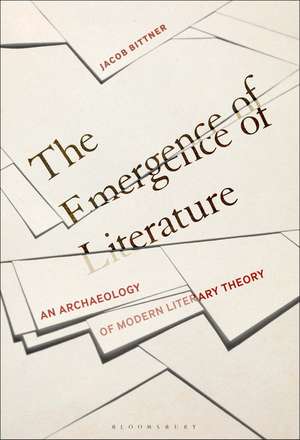The Emergence of Literature: An Archaeology of Modern Literary Theory
Autor Dr. Jacob Bittneren Limba Engleză Hardback – 22 ian 2020
| Toate formatele și edițiile | Preț | Express |
|---|---|---|
| Paperback (1) | 217.53 lei 6-8 săpt. | |
| Bloomsbury Publishing – 28 iul 2021 | 217.53 lei 6-8 săpt. | |
| Hardback (1) | 656.54 lei 6-8 săpt. | |
| Bloomsbury Publishing – 22 ian 2020 | 656.54 lei 6-8 săpt. |
Preț: 656.54 lei
Preț vechi: 943.16 lei
-30% Nou
Puncte Express: 985
Preț estimativ în valută:
125.63€ • 134.34$ • 104.75£
125.63€ • 134.34$ • 104.75£
Carte tipărită la comandă
Livrare economică 17 aprilie-01 mai
Preluare comenzi: 021 569.72.76
Specificații
ISBN-13: 9781501354243
ISBN-10: 1501354248
Pagini: 248
Dimensiuni: 152 x 229 x 23 mm
Greutate: 0.5 kg
Editura: Bloomsbury Publishing
Colecția Bloomsbury Academic
Locul publicării:New York, United States
ISBN-10: 1501354248
Pagini: 248
Dimensiuni: 152 x 229 x 23 mm
Greutate: 0.5 kg
Editura: Bloomsbury Publishing
Colecția Bloomsbury Academic
Locul publicării:New York, United States
Caracteristici
Presents an intellectual history that shows the links between several different and important literary theorists and philosophers from the European and American tradition
Notă biografică
Jacob Bittner is an independent scholar who earned his PhD in critical theory at King's College London, UK.
Cuprins
AcknowledgmentsNote on TextList of AbbreviationsIntroduction: Writerly NecessityPart 1 The Emergence of Literature as Absolute1. Literature as Pure Writing2. The Literary Absolute3. The Born PoetThresholdPart 2 The Paradigm of Writerly Necessity4. Between the Subject and Language5. The Paradigm of Writerly Necessity6. The Writer Who Cannot Not-Desire to WriteThresholdPart 3 Literary Criticism7. The Author (Sincerity)8. The Death of the Author (Intransitivity)9. The Politics of a priori PoetryThresholdPart 4 Aesthetics10. Literature in the Age of Criticism11. The Critic12. To Write as an Intransitive VerbThresholdAfterthought on Literary InoperativityConclusionNotesBibliographyIndex
Recenzii
[It] provides a meticulous resource and sets an ambitious standard for all those who question how to think about literature.
Jacob Bittner's The Emergence of Literature provides a welcome and rigorous reassessment of modern literature and theory's lost or 'unthought' unifying paradigm. ... In a field that has tended in recent years toward fragmentation and an increasing lack of communication between new schools, this is invigorating reassertion of a unifying paradigm that will serve as the basis for future dialogue on literary studies' most significant questions.
At a time when literary writings are studied primarily as manifestations of a given reality (moral needs, ecological dangers, racial problems, mental issues), Jacob Bittner's The Emergence of Literature offers a timely return to a critical tradition - running from the Schlegel brothers, Kant and Hölderlin over Heidegger and Blanchot to Barthes and Agamben - that chooses to define literature in its own terms. Taking his central cue from Lacoue-Labarthe and Nancy's L'absolu littéraire, Bittner aims for what he terms an archeology of literary theory, an understanding of the conceptual framework that made possible the idea that the true poet cannot but write poetry and that to write means to write 'intransitively', without reference to an external object. Bittner's book is by no means an easy read, but given the complex philosophical and aesthetic issues that he deals with, that in itself can only be taken as a compliment. A proper historiography of literary theory is one of the larger projects that the field of literary studies is in need of: I take this book to become a central contribution to that collective endeavor.
Bittner's work represents a genuinely original and interesting contribution both to contemporary literary-philosophical and literary-theoretical debate and to intellectual-historical accounts of the development of literary thought and practice since the Romantic era.
This book is the most thorough exploration of the 'Literary Absolute' I know - and a condensed intellectual history of continental thought in modernity.
A remarkable intellectual feat, based on an in- depth knowledge of continental philosophy and modern literary theory.
Jacob Bittner's The Emergence of Literature provides a welcome and rigorous reassessment of modern literature and theory's lost or 'unthought' unifying paradigm. ... In a field that has tended in recent years toward fragmentation and an increasing lack of communication between new schools, this is invigorating reassertion of a unifying paradigm that will serve as the basis for future dialogue on literary studies' most significant questions.
At a time when literary writings are studied primarily as manifestations of a given reality (moral needs, ecological dangers, racial problems, mental issues), Jacob Bittner's The Emergence of Literature offers a timely return to a critical tradition - running from the Schlegel brothers, Kant and Hölderlin over Heidegger and Blanchot to Barthes and Agamben - that chooses to define literature in its own terms. Taking his central cue from Lacoue-Labarthe and Nancy's L'absolu littéraire, Bittner aims for what he terms an archeology of literary theory, an understanding of the conceptual framework that made possible the idea that the true poet cannot but write poetry and that to write means to write 'intransitively', without reference to an external object. Bittner's book is by no means an easy read, but given the complex philosophical and aesthetic issues that he deals with, that in itself can only be taken as a compliment. A proper historiography of literary theory is one of the larger projects that the field of literary studies is in need of: I take this book to become a central contribution to that collective endeavor.
Bittner's work represents a genuinely original and interesting contribution both to contemporary literary-philosophical and literary-theoretical debate and to intellectual-historical accounts of the development of literary thought and practice since the Romantic era.
This book is the most thorough exploration of the 'Literary Absolute' I know - and a condensed intellectual history of continental thought in modernity.
A remarkable intellectual feat, based on an in- depth knowledge of continental philosophy and modern literary theory.
